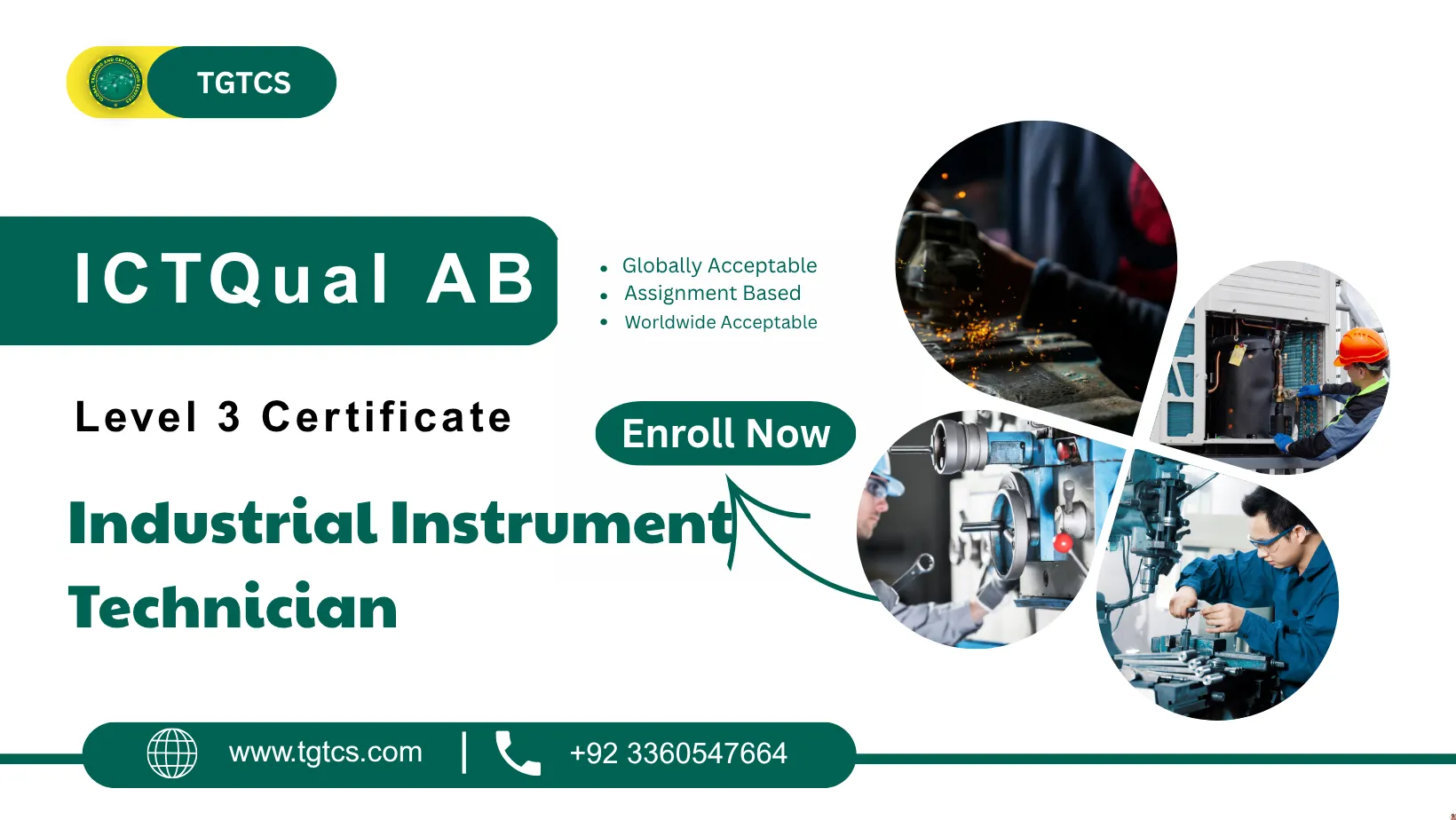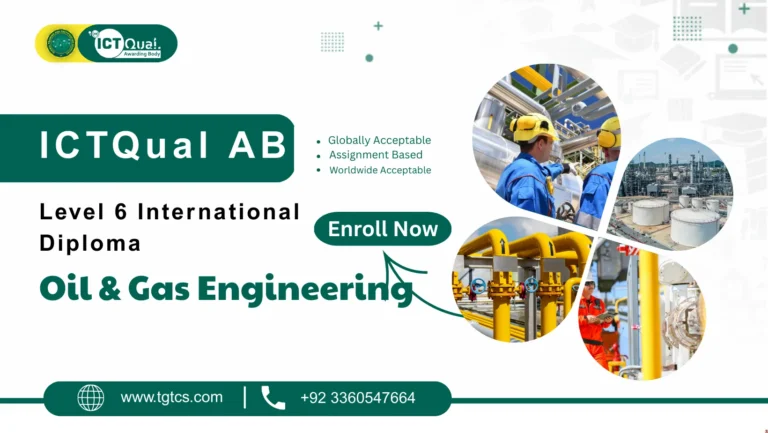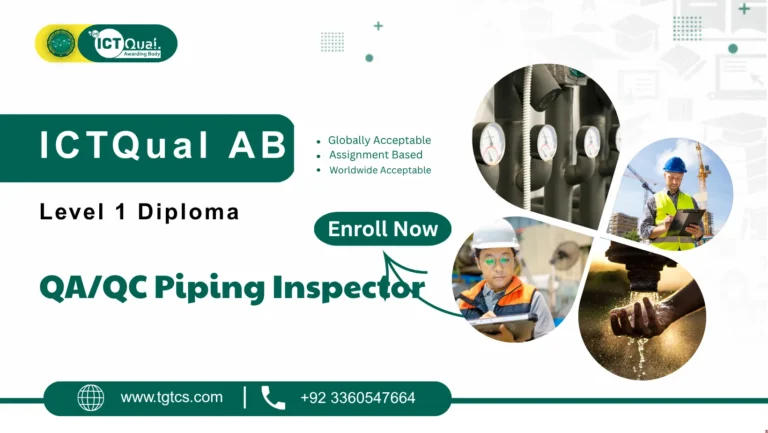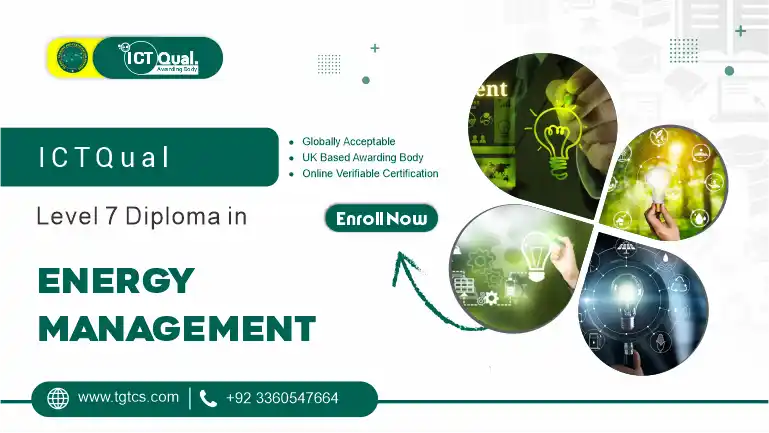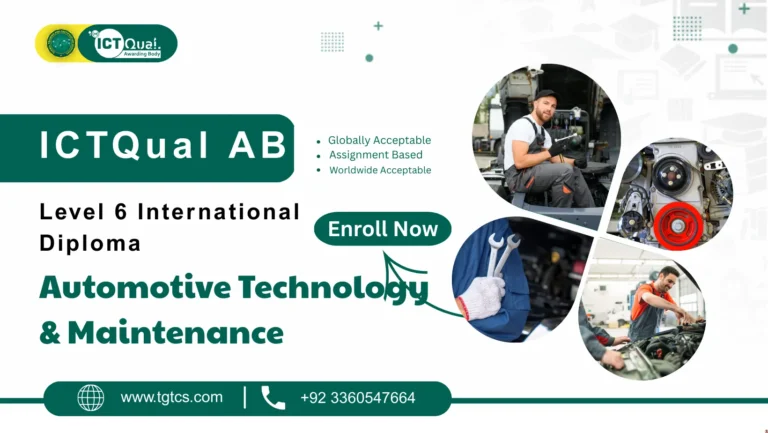ICTQual AB Level 3 Diploma in Industrial Instrument Technician
The ICTQual AB Level 3 Diploma in Industrial Instrument Technician is a comprehensive vocational qualification designed to equip learners with the technical expertise and practical skills required for careers in industrial instrumentation and process control. This diploma provides a structured pathway for individuals seeking to work in industries such as oil and gas, manufacturing, energy, and chemical processing, where precision and reliability in instrumentation are critical to operations.
Throughout the course, learners gain hands-on experience with a wide range of instruments including sensors, transmitters, controllers, and data acquisition systems. The curriculum covers essential topics such as installation, calibration, diagnostics, and maintenance of instrumentation systems. Learners also develop the ability to interpret technical drawings, understand process control principles, and apply safety standards in industrial environments, ensuring they are well-prepared for real-world challenges.
By completing this diploma, graduates will be qualified to take on technician-level roles and contribute effectively to industrial projects. The ICTQual AB Level 3 Diploma not only enhances employability but also serves as a foundation for further academic progression in engineering and automation. With its global recognition and practical focus, this qualification opens doors to rewarding careers in diverse industrial sectors.
The Global Training and Certification Services is Approved Training Centre of ICTQual AB UK Ltd
Course Level and Credits
The ICTQual AB Level 3 Diploma in Industrial Instrument Technician is a vocational qualification at Level 3, designed to meet international standards for technical education. It carries a credit value aligned with global frameworks, ensuring recognition and portability across borders.
Mode of Study
The course is delivered through a blended learning approach, combining classroom instruction, practical workshops, and self-paced study. This flexible format allows learners to gain hands-on experience while accommodating their personal and professional commitments.
Global Recognition & Attestation
This diploma is globally recognized and can be attested by relevant authorities for international employment and academic progression. It meets the criteria for equivalency in multiple regions, making it a valuable credential for technicians seeking opportunities abroad.
Scope and Purpose
The course is designed to prepare learners for technician-level roles in industrial instrumentation and process control. It covers the installation, calibration, maintenance, and troubleshooting of instruments used in sectors such as manufacturing, oil & gas, energy, and chemical processing.
Skills and Knowledge Gained
Learners develop a strong foundation in instrumentation principles, including working with sensors, transmitters, controllers, and data acquisition systems. They also gain proficiency in interpreting technical drawings, applying safety standards, and using diagnostic tools to solve real-world problems.
Career Benefits
Graduates of this program are equipped to pursue careers as industrial instrument technicians, maintenance specialists, or automation support personnel. The qualification enhances employability, supports career advancement, and opens pathways to further study in engineering and technology disciplines.
Mandatory Unit
This qualification, the Level 3 Diploma in Industrial Instrument Technician, consists of 6 mandatory units.
- Fundamentals of Industrial Instrumentation
- Process Variables: Pressure, Temperature, Flow, and Level
- Instrument Calibration and Testing Techniques
- Industrial Sensors, Transducers, and Control Valves
- Programmable Logic Controllers (PLCs) and Process Automation
- Maintenance, Troubleshooting, and Industrial Safety
Learning Outcomes for the Level 3 Diploma in Industrial Instrument Technician:
Fundamentals of Industrial Instrumentation
- Understand the scope and importance of instrumentation in industrial operations.
- Explain the principles of measurement systems, accuracy, precision, and error analysis.
- Identify different types of instruments and their applications across industries.
- Apply basic electrical and electronic concepts relevant to instrumentation.
- Recognise international standards, codes, and practices in instrumentation.
- Demonstrate awareness of how instrumentation supports automation and efficiency.
- Build a foundation for advanced study in process control and automation.
- Develop the ability to link theoretical knowledge with practical applications.
Process Variables: Pressure, Temperature, Flow, and Level
- Define and explain the four key process variables and their industrial significance.
- Describe the principles and methods used to measure each process variable.
- Compare different devices and technologies used for measurement.
- Analyse how process variables affect safety, quality, and efficiency.
- Select appropriate instruments for specific process requirements.
- Interpret measurement data to support operational decision-making.
- Understand calibration requirements for process variable instruments.
- Relate process variable control to system optimisation and energy efficiency.
Instrument Calibration and Testing Techniques
- Explain the purpose and importance of calibration in industrial settings.
- Identify international standards and procedures for calibration and testing.
- Perform calibration of common industrial instruments using correct methods.
- Use calibration tools and equipment safely and effectively.
- Record, interpret, and evaluate calibration results for compliance.
- Troubleshoot errors and deviations identified during calibration.
- Understand preventive maintenance practices to reduce calibration failures.
- Develop competence in documenting calibration and test reports.
Industrial Sensors, Transducers, and Control Valves
- Differentiate between sensors, transducers, and actuators in instrumentation.
- Explain the working principles of common industrial sensors and transducers.
- Select suitable sensors for specific process applications.
- Understand the design, function, and operation of control valves.
- Analyse the role of control valves in regulating process variables.
- Apply knowledge of valve characteristics, sizing, and selection.
- Identify common faults in sensors and valves and propose corrective actions.
- Integrate sensors and control valves into automated control systems.
Programmable Logic Controllers (PLCs) and Process Automation
- Understand the architecture and components of PLC systems.
- Explain the role of PLCs in industrial automation and process control.
- Develop basic PLC programming skills using ladder logic or equivalent languages.
- Configure input and output devices for PLC-based systems.
- Apply PLCs to monitor and control industrial processes.
- Integrate PLCs with sensors, actuators, and communication networks.
- Troubleshoot common PLC hardware and software issues.
- Appreciate the role of PLCs in Industry 4.0 and smart manufacturing.
Maintenance, Troubleshooting, and Industrial Safety
- Understand the principles of preventive, predictive, and corrective maintenance.
- Apply systematic troubleshooting techniques to diagnose faults.
- Use diagnostic tools and test equipment effectively in maintenance tasks.
- Recognise the importance of safety standards and regulations in instrumentation.
- Implement safe working practices when handling instruments and systems.
- Identify potential hazards in industrial environments and propose mitigation strategies.
- Document maintenance and troubleshooting activities in line with industry standards.
- Develop a professional attitude towards reliability, safety, and continuous improvement.
The ICTQual AB Level 3 Diploma in Industrial Instrument Technician offers learners a structured pathway to develop technical expertise, practical experience, and industry-relevant skills. This qualification is designed to prepare individuals for technician-level roles in diverse industrial environments.
Technical Skills and Competency
- Install, calibrate, and maintain industrial instruments such as sensors, transmitters, and controllers
- Interpret P&ID diagrams, loop drawings, and technical schematics
- Perform diagnostics and troubleshoot faults in instrumentation systems
- Use standard tools and equipment for measurement and calibration
- Understand process control principles and automation technologies
Industry Knowledge and Application
- Explore instrumentation roles in oil & gas, manufacturing, energy, and chemical sectors
- Understand integration with SCADA, PLC, and DCS systems
- Apply safety protocols and comply with regulatory standards
- Support documentation and reporting for maintenance and calibration activities
- Ensure adherence to industrial specifications and operational guidelines
Career Progression and Recognition
- Earn a globally recognized qualification to enhance professional credibility
- Qualify for technician-level roles in instrumentation and control
- Build a foundation for progression to advanced diplomas or engineering programs
- Improve eligibility for roles in multinational companies and industrial projects
- Benefit from attestation options for international mobility
Workplace Readiness and Employability
- Demonstrate readiness for fieldwork, maintenance, and operational support
- Build teamwork and communication skills for collaborative environments
- Strengthen problem-solving and decision-making abilities
- Understand workplace safety and professional conduct
- Access opportunities for internships, apprenticeships, and on-site training
Personal Development and Confidence
- Gain confidence through hands-on practice and real-world simulations
- Develop discipline and attention to detail in technical tasks
- Cultivate a safety-first approach and responsible work habits
- Experience the satisfaction of mastering complex systems
- Build a sense of pride and ownership in technical craftsmanship
This diploma equips learners with the knowledge, skills, and mindset needed to succeed in industrial instrumentation roles and supports long-term career growth in the global industrial sector.
The ICTQual AB Level 3 Diploma in Industrial Instrument Technician is designed for learners who are passionate about technology, eager to work in industrial environments, and committed to building a career in instrumentation and control systems. This course suits a wide range of individuals, from newcomers to experienced professionals seeking formal recognition of their skills.
Aspiring Technicians and Fresh Graduates
- Individuals who have completed secondary education and are interested in technical careers
- Learners looking to enter the industrial instrumentation field with a recognized qualification
- Those who prefer hands-on, skill-based training over purely academic study
- Candidates aiming to work in sectors such as oil & gas, manufacturing, or energy
- Students seeking a practical route into engineering and automation disciplines
Vocational and Technical School Graduates
- Graduates of electrical, mechanical, or automation programs seeking specialization
- Learners aiming to enhance their qualifications with industry-relevant certification
- Individuals transitioning from general technical roles to instrumentation-focused careers
- Those preparing for advanced studies in engineering or industrial technology
- Candidates looking to meet employer requirements for certified instrumentation personnel
Maintenance and Operations Personnel
- Technicians already working in industrial settings who want to expand their skill set
- Operators seeking deeper understanding of the systems they interact with daily
- Employees aiming for promotion into instrumentation or control roles
- Staff involved in troubleshooting and diagnostics of industrial systems
- Workers needing formal certification to meet compliance or advancement criteria
Career Changers and Industry Entrants
- Individuals from non-technical backgrounds looking to enter the industrial sector
- Career changers interested in automation, process control, and instrumentation
- Learners seeking stable, in-demand roles in industrial environments
- Candidates looking for internationally recognized qualifications for global mobility
- People returning to education with a focus on applied technical skills
Professionals Seeking Certification and Recognition
- Technicians with informal experience who lack formal credentials
- Employees seeking certification for regulatory or employer requirements
- Individuals aiming to validate their skills for international employment
- Professionals preparing for supervisory or instructional roles
- Workers looking to enhance their resumes with a globally recognized qualification
The ICTQual AB Level 3 Diploma in Industrial Instrument Technician is ideal for learners at various stages of their professional journey. It offers the technical depth, practical training, and global recognition needed to thrive in today’s industrial landscape.
Course Overview
Course Level
Level 3
Course Units
6 Units
Credits
30
